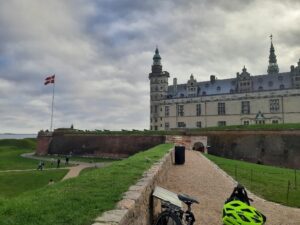Kategorie: ‘Copenhagen’
Internship in Copenhagen
- Architecture M.Sc.
- Denmark, Copenhagen
- Cobe A/S
- 03/2023 – 08/2023
Search and preparation:
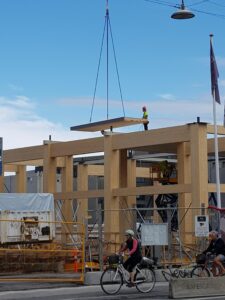
© Leonard Schneider
When looking for internships abroad I quickly came to the conclusion that I wanted to go to Copenhagen. The reasons for that are mainly twofold, with the city being home to an exceptionally broad range of offices being one, and the cities transformation over the last decades into one of the most liveable in Europe being the other. This again is intertwined, as the offices residing in the city both shaped it and are now exporting the Copenhagen brand of urbanism globally.
The architecture office Cobe is one that is deeply involved in these processes as it has designed a range of projects in the city, most notable the master plan for the 30-year transformation of the North Harbour area. I was therefore very happy to be working as part of the design team for half a year.
In applying to Danish architecture firms, it is important to be aware of the early timeline. The semester in Denmark stars before it does in Germany and that plays into the application process usually taking place in October/ November for the spring term and April/ May for the fall term with the internships usually beginning either in February or August, though there often are exceptions if you talk to your prospective office, especially regarding the German semester rhythm.
It might also be good to know, that the large offices often take up to multiple dozens of interns each year whereas smaller offices only have few openings.
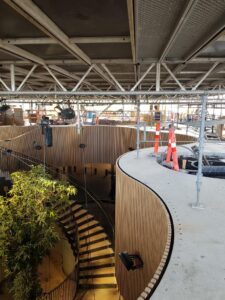
© Leonard Schneider
Finances and apartments:
Financially a stay in Copenhagen is much more viable together with the Erasmus grant, as most offices only pay the equivalent of the Danish student grant (around 900€). Combining both sources of income allows an otherwise self-reliant stay.
Apartments are most commonly found via Facebook groups. There exist a lot of them, and it is important to go through a few to get a feeling of which are currently frequently posted to and whether it is mostly regular people or agencies. Typically, students are looking for apartments under 5000kr. This means cheaper apartments are extremely in demand and super hard to get if you are not able to commit longer than six months. Beware that in my experience and in talking to friends, some of the cheaper offers turn out to be scams. In my case I ended up finding a room in a flat share for around 6500kr, a budget that both extended the horizon of available rooms as well as allowing me to stay within my overall budget as described above.
There also exists the model of either families or older people renting out one of their rooms. I have mostly heard good things from friends about that.
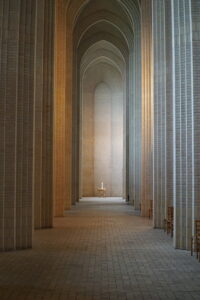
© Leonard Schneider
Also be aware that most rooms are offered on a very short notice. It usually does not help to be looking months in advance, but in the six weeks before going. Contracts are also commonly signed after moving in.
Other formalities:
With moving to Denmark, you also have to register a few things. Those might still take a while, so try to get started as soon after arriving as you can.
First you must get your EU residence form (different process if you are not from the EU), then apply for a CPR-number and then with that you can get your tax-card and Danish bank account. All these are important for you to receive your salary. It might take up to three months, but most offices will offer to send you first pay checks also to a German bank, but not all as that makes taxation much harder for both sides.
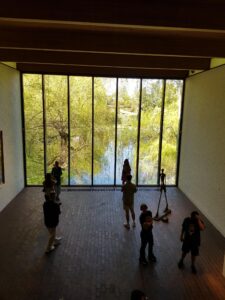
© Leonard Schneider
Work and life in Copenhagen:
One of the biggest factors impacting life in Copenhagen is the season of the year. Depending on the month it might be either one of the most introverted or one of the most extroverted cities.
In the summer months the whole city is humming with people spending time in the public spaces, the water fronts in the harbours, or the many street side cafes and bakeries.
On the other hand, Danes will be snuggling up in their hygge apartments to escape the cold and dark season.
Tastes might differ, but I was very happy with my time spend going straight from the office to swim with the other interns in the harbour after work.
This brings me to my experience at work. I put both work and life into one paragraph as their coexistence was one of favourite things in my time there. Most offices work from 9:00 to 16:30 including a half hour lunch break. This of cause might differ before deadlines, but especially the Danish staff takes their time off very seriously,
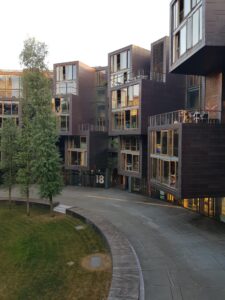
© Leonard Schneider
with even management often packing up around 15:00 on Fridays, resulting in a very healthy work environment.
Additionally, most of my social contacts were from getting to know the many other interns at my office and from there also getting to know some more from other offices in the city. Having this immediate group of people at the same age and stage of their studies as you was a great way to find a place in the new environment.
Regarding my work, I got to help with design of multiple projects ranging from an architectural to an urban scale. For each project the teams and the seating arrangement changed, which helped with getting to know more people.
English is universally spoken, but in looking for an office it might still make sense to get a feel for whether the office is primary presenting itself in English or Danish. This might give and idea of the balance of the workforce being more or less international. Learning Danish is definitely not a requirement, but at least trying to learn while you are there is a guarantee to be on good terms with any Dane you come across. There also are free courses in the city to encourage that.
My master thesis in Denmark
- Molecular and Applied Biotechnology, M.Sc.
- Denmark, Greater Copenhagen
- Technical University of Denmark

The Shakespeare caste in Helsingør, a nice destination for a day trip on the bike.
© Rebekka Horstmann - 10/2022 – 05/2023
To complete my master’s in biotechnology I was looking for a master’s thesis abroad and the Novo Nordisk Foundation Center for Biosustainability (CfB) at the Technical University of Denmark came to my attention. Denmark is well known for its thriving biotech sector and the center convinces with a strong focus on delivering more sustainable solutions for our society.
Finding accommodation in Greater Copenhagen can be challenging since not only the rent but also the deposits and prepaid rents can be a deterrent. However, student housing is in part also applicable for master thesis students at the accommodation office of DTU. While renting a studio apartment in a dorm is not necessarily the cheapest option, it makes flat hunting easier. Another common practicality is to have the moving-out date a couple of days, for example 10 working days, before the end of the lease, which is good to keep in mind.
During my stay at CfB, I was seated in an office with other master’s students, PhD students, research assistants, and a fermentation engineer which was a great chance to get very diverse input to the questions and challenges that came up along the way. In general, I experienced fairly flat hierarchies, and the openly designed workspace allowed for a lot of fruitful scientific discussions. As mandatory for an external thesis, I found examiners in Aachen before I started my project and had supervisors at the external institution. I was lucky to experience very supportive and thoughtful supervision which allowed me to develop a broad skill set. Fortunately, a Symposium was hosted at DTU on my last day, giving me the chance to present my findings on a poster and to get additional input.
Since DTU is a campus university, a lot of activities are offered in very close proximity. Therefore, it is easy to meet some other people during sports causes even with a full experimental schedule. Another part of the Danish work culture is the concept of “Friday bars”. In my center, the Friday bar was held once a month and was basically everyone gathering with a beer or soda in the canteen during the afternoon. That created a very relaxing atmosphere and gave a lot of opportunities to get to know your colleagues besides work topics as well as people from other research groups.
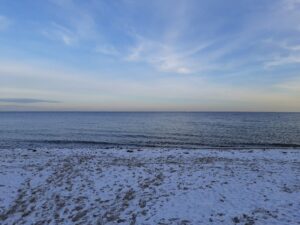
Skodsborg beach during the ice bathing season.
© Rebekka Horstmann
While written Danish is maybe not impossible to understand as a German-speaking person, spoken Danish can be quite tough. However, once you are registered in the civil registration system (and have a CPR number), the Danish government offers language courses in exchange for a deposit only. These courses are a great opportunity to meet other international students from different disciplines, have fun in practicing all the sounds in the Danish language, and of course, learn some basic Danish.
Regarding free time activities I can highly recommend to either bring or rent a bike. All across Zealand, there is a quite good network of bike lanes which is perfect to take a day trip to one of the many castles such as the so-called Shakespeare castle in Helsingør. It is also very convenient to explore the inner city of Copenhagen by bike and in most cases, you can even take it on public transport for free. As soon as the temperatures drop, you can see a lot of Danes going for an ice bath at one of the beaches which I can highly recommend giving a try.
Copenhagen – A city full of life
- Architecture M.Sc.
- Copenhagen, Denmark
- Sweco Architects
- 28.03.2022 – 30.09.2022
While studying architecture, we have to do an internship before writing our master thesis. I chose to complete mine in Copenhagen. I totally fell in love with the city. Especially during the summer month, its just amazing. The weather was mostly good, not too warm and when the sun shines, the people and the city unfold so much life, lightness and openness. You can see how precious the sun and the light is, as soon as it´s sunny, life happens outside, by the water, in parks, cafés… The city has the perfect size, it´s big enough to fill 6 months with new experience, and I still haven’t seen everything, but you also cannot get lost. There are always familiar corners and sometimes it´s like a little village.
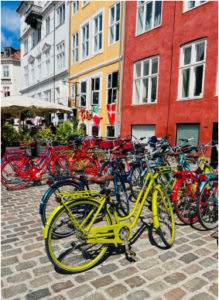
© Amelie Weber
The Danes are sometimes a bit closed, and you have to warm their heart before they let you in, but in general they are always friendly and up to help you. They will be confused if you smile at them without a reason, but it’s a challenge to win them as your friend, and you will succeed. I met so many amazing people, I don’t want to miss in my life anymore. The city is also filled up with internationals from all over the world, you will for sure find a big community from your home country, if you feel like surrounding yourself with people from home. But I recommend mixing it up, Danes, people from your home country, other internationals. That´s what made it very interesting and also informative for me. That’s also a good way for your English to improve enormously. Danes speak English very well, no matter how old they are. It´s very easy to survive with only speaking English and no one will expect you to change that or look at you in a weird way, if you don’t speak Danish.
Denmark, especially Copenhagen, is super expensive. You cannot survive with the Erasmus money only, it needs to be combined with a salary, and in my case my parents also send me money, since the company didn’t pay me that well. In those 6 month I´ve spend around 11.000 euros while having a normal amount of free time activities. Going to a bar and paying 55 DKK (7,40 euros) is normal.
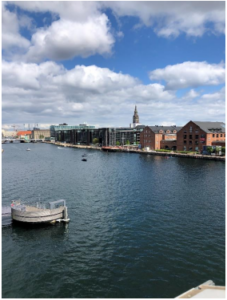
© Amelie Weber
I rented a Swapfiets during my stay and that was perfect. Public transportation works very well in Denmark, but is also expensive. Everything that can be reached by bike in 30 min, is done by bike. The bike lanes are a dream and on your way to work you will probably meet your boss on a cargo bike with some kids in it.
I would recommend to start the search for an apartment in time. The market is super fast. I didn’t have any success with Facebook groups, but can recommend “findroommate” or “BoligPortal”. You will have to pay a fee to use those portals, but for me, it was worth the money because I found the most amazing room and roommate.
If you stay longer the 3 month and earn money, you will have to register for EU registration and CPR number. Do it as fast as possible, the waiting time is pretty long. You will need it, to open a bank account and to get access to the Danish health system. As a bank I recommend Lunar, the waiting time was 2 weeks and everything is online and English. The waiting time for one of the big Danish banks is usually around 6-7 weeks.
For me, those 6 month were the most amazing month of my life and fell in love with the city. I hope everyone else, who is choosing Copenhagen, has the same experience. I can recommend the city very much and the Erasmus money will help a lot. I am very grateful I got the chance to have that money. Last but not least: Enjoy the time!
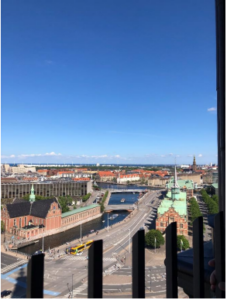
© Amelie Weber
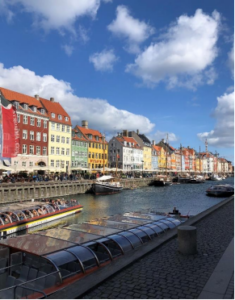
© Amelie Weber
Architekturpraktikum in Kopenhagen
- M.Sc. Architecture
- Denmark, Copenhagen
- 01.09.2020 – 31.08.2021
Meine Erfahrung:
Im Rahmen meines Studiums ist ein Pflichtpraktikum vorgesehen. Wie die meisten Architekturstudenten, hatte ich vor mein Praktikum zwischen meinem Bachelor und Master zu machen. Februar 2020 war gekennzeichnet mit meinem Bachelorabschluss und mit der weltweiten Ausbreitung vom Coronavirus. Dieses Ereignis zeigte globale Auswirkungen und hat auch mein Praktikum beeinflusst.
Mit der Suche nach einem Praktikum muss man ca. ein halbes Jahr vor dem geplanten Beginn anfangen. Für die meisten Architekturbüros bewirbt man sich entweder bis April oder bis Oktober und wenn man eine Zusage bekommt, hat man genug Zeit sich auf die Reise vorzubereiten.
Während des Studiums habe ich schon fast 3 Jahre als studentische Hilfskraft bei einer Architekturfirma in Aachen gearbeitet. Da ich den Überblick vom Alltag eines deutschen Architekturbüro bekommen habe, bewarb ich mich außerhalb Deutschlands. Ich wollte bevorzugterweise nach Skandinavien, wo die Architektur in den letzten Jahrzehnten einen Aufschwung nahm. Nachdem ich etwa 3 Wochen lang nach Stellen gesucht und mich beworben hatte, habe ich einen Platz in einem Büro in Kopenhagen bekommen.
Nach der Zusage will man wahrscheinlich sofort mit der Wohnungssuche anfangen, aber in Dänemark oder zumindest in Kopenhagen funktioniert es anders. Das Wohnungsangebot ist sehr kurzfristig. In den meisten Fällen suchen Mieter jemanden, der schon in 2 Wochen oder höchstens in einem Monat einziehen kann. Aus diesem Grund wird die Suche nach einer Unterkunft schon 3 Monaten vor der Reise wahrscheinlich keinen Erfolg bringen. Um eine Wohnung zu finden gibt es mehrere Möglichkeiten. Auf Facebook gibt es einige Gruppen, in denen WG-Zimmer oder Wohnungen beworben werden, jedoch gibt es dort sehr viele Interessenten und man muss sehr schnell sein und Glück haben, um überhaupt eine Antwort zu bekommen. Zudem gibt es noch spezielle Onlineportale, für die man zwar monatlich bezahlen muss, aber eventuell bessere Chancen hat. Ich habe ein Konto bei https://www.boligportal.dk erstellt und habe relativ schnell ein Zimmer bekommen. Die Preise sind je nach Lage, Größe und Ausstattung sehr verschieden. Durchschnittliche Preise sind ca. 4000-6000 dänische Kronen für ein WG-Zimmer. Günstigere Zimmer liegen dann meistens etwas außerhalb des Zentrums, etwa 30 Minuten mit der Bahn.
Um schnell von A nach B zu kommen, sind Fahrräder sehr praktisch. Das Fahrradnetz ist sehr gut in Kopenhagen ausgebaut, daher empfiehlt es sich schon früh ein Fahrrad zu besorgen. Das kann man entweder gebraucht über Kleinanzeigen auf Facebook, dba.dk und Flohmärkten oder neu in einem der zahlreichen Fahrradläden kaufen. Eine andere Möglichkeit ist Swapfiets, dort kann man monatlich ein Fahrrad mieten. Dies beinhaltet auch einen Reparaturservice und kostet je nach Ausstattung 160-180 Kronen. Das lohnt sich vor allem wenn man vorhat, nur für ein paar Monate zu bleiben, wenn der Aufenthalt länger ist, sollte man eher ein Fahrrad kaufen. Falls man jedoch den öffentlichen Transport für die tägliche Fahrt zur Arbeit nutzen will, kann man sich eine Monatskarte bei dsb.dk besorgen. Wenn man dies nicht braucht, lohnt es sich für Einzelfahrten eine sogenannte Rejsekort zuzulegen.
Das Wetter hat einen großen Einfluss auf die Kultur und Lebensweise in Kopenhagen. In den kälteren Monaten verbringt man sehr viel Zeit im Inneren, da es viel regnet und es oft sehr windig ist. Es macht also Sinn eine Regenjacke und eventuell eine Regenhose mitzubringen, die man in Deutschland günstiger kaufen kann. Bei schönem Wetter jedoch sind die Kopenhagener Bewohner*innen sehr viel draußen aktiv und genießen die Sonne.
Die Stadt bietet zahlreiche Möglichkeiten seine freie Zeit zu verbringen, besonders im Sommer. Es gibt viele Museen, Ausstellungen, Galerien und vor allem architektonische Highlights, sowie Veranstaltungen, Konzerte und Parties in der ganzen Stadt. Ein beliebtes Ausgehviertel ist vor allem Vesterbro und der dort befindliche Meatpacking District. Im Stadtzentrum gibt es viele Orte, um baden zu gehen; die Dän*innen nutzen diese nicht nur im Sommer, sondern eigentlich zu jeder Jahreszeit. Zudem ist auch der nächste Badestrand in Amager nur 20-30 Minuten mit dem Fahrrad entfernt. Weiterhin ist der Rest von Dänemark, wie z.B. Aarhus oder die Westküste, mit dem Zug in wenigen Stunden gut erreichbar und auch Schweden ist nur eine halbe Stunde entfernt.
Zusammenfassend kann man sagen, dass ich mein Praktikum in Kopenhagen sehr genossen habe. Die Stadt ist wunderschön und auch die Arbeit hat mir sehr viel Spaß gemacht. Ich kann es also nur empfehlen sich dort zu bewerben. Wenn man die Möglichkeit hat, sollte man jedoch länger als 6 Monate bleiben, um die Stadt und die dänische Lebensweise bestmöglich erleben zu können.


